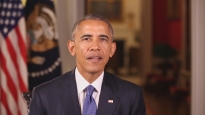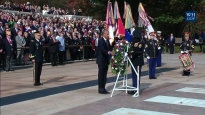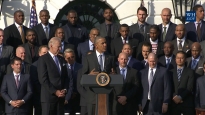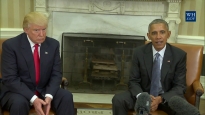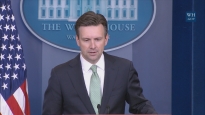President Obama Speaks on Building Ladders of Opportunity into the Middle Class
February 15, 2013 | 26:56 | Public Domain
President Obama discusses the plan he laid out in the State of the Union to strengthen communities and families, and make sure every American and every community willing to do the work has the opportunity to lift themselves up.
Remarks By The President On Strengthening The Economy For The Middle Class
3:31 P.M. CST
THE PRESIDENT: Hey, Chicago! (Applause.) Hello, Chicago! Hello, everybody. Hello, Hyde Park! (Applause.) It is good to be home! It is good to be home. Everybody have a seat. You all relax. It’s just me. You all know me. It is good to be back home.
A couple of people I want to acknowledge -- first of all, I want to thank your Mayor, my great friend, Rahm Emanuel for his outstanding leadership of the city and his kind introduction. (Applause.) I want to thank everybody here at Hyde Park Academy for welcoming me here today. (Applause.)
I want to acknowledge your principal and your assistant principal -- although, they really make me feel old, because when I saw them -- (laughter) -- where are they? Where are they? Stand up. Stand up. (Applause.) They are doing outstanding work. We’re very, very proud them. But you do make me feel old. Sit down. (Laughter.)
A couple other people I want to acknowledge -- Governor Pat Quinn is here doing great work down in Springfield. (Applause.) My great friend and senior Senator Dick Durbin is in the house. (Applause.) Congressman Bobby Rush is here. (Applause.) We’re in his district. Attorney General and former seatmate of mine when I was in the state senate, Lisa Madigan. (Applause.) County Board President -- used to be my alderwoman -- Tony Preckwinkle in the house. (Applause.)
And I’ve got -- I see a lot of reverend clergy here, but I’m not going to mention them, because if I miss one I’m in trouble. (Laughter.) They’re all friends of mine. They’ve been knowing me.
Some people may not know this, but obviously, this is my old neighborhood. I used to teach right around the corner. This is where Michelle and I met, where we fell in love --
AUDIENCE: Aww --
THE PRESIDENT: This is where we raised our daughters, in a house just about a mile away from here -- less than a mile. And that’s really what I’ve come here to talk about today -- raising our kids.
AUDIENCE: We love you!
THE PRESIDENT: I love you, too. (Applause.) I love you, too.
I’m here to make sure that we talk about and then work towards giving every child every chance in life; building stronger communities and new ladders of opportunity that they can climb into the middle class and beyond; and, most importantly, keeping them safe from harm.
Michelle was born and raised here -- a proud daughter of the South Side. (Applause.) Last weekend, she came home, but it was to attend the funeral of Hadiya Pendleton. And Hadiya’s parents, by the way, are here -- and I want to just acknowledge them. They are just wonderful, wonderful people. (Applause.)
And as you know, this week, in my State of the Union, I talked about Hadiya on Tuesday night and the fact that unfortunately what happened to Hadiya is not unique. It's not unique to Chicago. It's not unique to this country. Too many of our children are being taken away from us.
Two months ago, America mourned 26 innocent first-graders and their educators in Newtown. And today, I had the high honor of giving the highest civilian award I can give to the parent -- or the families of the educators who had been killed in Newtown. And there was something profound and uniquely heartbreaking and tragic, obviously, about a group of 6-year-olds being killed. But last year, there were 443 murders with a firearm on the streets of this city, and 65 of those victims were 18 and under. So that’s the equivalent of a Newtown every four months.
And that’s precisely why the overwhelming majority of Americans are asking for some common-sense proposals to make it harder for criminals to get their hands on a gun. And as I said on Tuesday night, I recognize not everybody agrees with every issue. There are regional differences. The experience of gun ownership is different in urban areas than it is in rural areas, different from upstate and downstate Illinois. But these proposals deserve a vote in Congress. They deserve a vote. (Applause.) They deserve a vote. And I want to thank those members of Congress who are working together in a serious way to try to address this issue.
But I’ve also said no law or set of laws can prevent every senseless act of violence in this country. When a child opens fire on another child, there’s a hole in that child’s heart that government can't fill -- only community and parents and teachers and clergy can fill that hole. In too many neighborhoods today -- whether here in Chicago or the farthest reaches of rural America -- it can feel like for a lot of young people the future only extends to the next street corner or the outskirts of town; that no matter how much you work or how hard you try, your destiny was determined the moment you were born. There are entire neighborhoods where young people, they don’t see an example of somebody succeeding. And for a lot of young boys and young men, in particular, they don’t see an example of fathers or grandfathers, uncles, who are in a position to support families and be held up and respected.
And so that means that this is not just a gun issue. It’s also an issue of the kinds of communities that we’re building. And for that, we all share a responsibility, as citizens, to fix it. We all share a responsibility to move this country closer to our founding vision that no matter who you are, or where you come from, here in America, you can decide your own destiny. You can succeed if you work hard and fulfill your responsibilities. (Applause.)
Now, that means we’ve got to grow our economy and create more good jobs. It means we’ve got to equip every American with the skills and the training to fill those jobs. And it means we’ve got to rebuild ladders of opportunity for everybody willing to climb them.
Now, that starts at home. There’s no more important ingredient for success, nothing that would be more important for us reducing violence than strong, stable families -- which means we should do more to promote marriage and encourage fatherhood. (Applause.) Don’t get me wrong -- as the son of a single mom, who gave everything she had to raise me with the help of my grandparents, I turned out okay. (Applause and laughter.) But -- no, no, but I think it’s -- so we’ve got single moms out here, they’re heroic in what they’re doing and we are so proud of them. (Applause.) But at the same time, I wish I had had a father who was around and involved. Loving, supportive parents -- and, by the way, that’s all kinds of parents -- that includes foster parents, and that includes grandparents, and extended families; it includes gay or straight parents. (Applause.)
Those parents supporting kids -- that’s the single most important thing. Unconditional love for your child -- that makes a difference. If a child grows up with parents who have work, and have some education, and can be role models, and can teach integrity and responsibility, and discipline and delayed gratification -- all those things give a child the kind of foundation that allows them to say, my future, I can make it what I want. And we’ve got to make sure that every child has that, and in some cases, we may have to fill the gap and the void if children don’t have that.
So we should encourage marriage by removing the financial disincentives for couples who love one another but may find it financially disadvantageous if they get married. We should reform our child support laws to get more men working and engaged with their children. (Applause.) And my administration will continue to work with the faith community and the private sector this year on a campaign to encourage strong parenting and fatherhood. Because what makes you a man is not the ability to make a child, it’s the courage to raise one. (Applause.)
We also know, though, that there is no surer path to success in the middle class than a good education. And what we now know is that that has to begin in the earliest years. Study after study shows that the earlier a child starts learning, the more likely they are to succeed -- the more likely they are to do well at Hyde Park Academy; the more likely they are to graduate; the more likely they are to get a good job; the more likely they are to form stable families and then be able to raise children themselves who get off to a good start.
Chicago already has a competition, thanks to what the Mayor is doing, that rewards the best preschools in the city -- so Rahm has already prioritized this. But what I’ve also done is say, let’s give every child across America access to high-quality, public preschool. Every child, not just some. (Applause.) Every dollar we put into early childhood education can save $7 down the road by boosting graduation rates, reducing teen pregnancy, reducing violent crime, reducing the welfare rolls, making sure that folks who have work, now they’re paying taxes. All this stuff pays back huge dividends if we make the investment. So let’s make this happen. Let’s make sure every child has the chance they deserve. (Applause.)
As kids go through school, we’ll recruit new math and science teachers to make sure that they’ve got the skills that the future demands. We’ll help more young people in low-income neighborhoods get summer jobs. We’ll redesign our high schools and encourage our kids to stay in high school, so that the diploma they get leads directly to a good job once they graduate. (Applause.)
Right here in Chicago, five new high schools have partnered with companies and community colleges to prepare our kids with the skills that businesses are looking for right now. And your College to Careers program helps community college students get access to the same kinds of real-world experiences. So we know what works. Let’s just do it in more places. Let’s reach more young people. Let’s give more kids a chance.
So we know how important families are. We know how important education is. We recognize that government alone can’t solve these problems of violence and poverty, that everybody has to be involved. But we also have to remember that the broader economic environment of communities is critical as well. For example, we need to make sure that folks who are working now, often in the hardest jobs, see their work rewarded with wages that allow them to raise a family without falling into poverty. (Applause.)
Today, a family with two kids that works hard and relies on a minimum wage salary still lives below the poverty line. That’s wrong, and we should fix it. We should reward an honest day’s work with honest wages. And that's why we should raise the minimum wage to $9 an hour and make it a wage you can live on. (Applause.)
And even though some cities have bounced back pretty quickly from the recession, we know that there are communities and neighborhoods within cities or in small towns that haven’t bounced back. Cities like Chicago are ringed with former factory towns that never came back all the way from plants packing up; there are pockets of poverty where young adults are still looking for their first job.
And that’s why on Tuesday I announced -- and that's part of what I want to focus on here in Chicago and across the country -- is my intention to partner with 20 of the hardest-hit communities in America to get them back in the game -- get them back in the game. (Applause.)
First, we’ll work with local leaders to cut through red tape and improve things like public safety and education and housing. And we’ll bring all the resources to bear in a coordinated fashion so that we can get that tipping point where suddenly a community starts feeling like things are changing and we can come back.
Second of all, if you’re willing to play a role in a child’s education, then we’ll help you reform your schools. We want to seed more and more partnerships of the kind that Rahm is trying to set up.
Third, we’re going to help bring jobs and growth to hard-hit neighborhoods by giving tax breaks to business owners who invest and hire in those neighborhoods. (Applause.)
Fourth, and specific to the issue of violence -- because it’s very hard to develop economically if people don't feel safe. If they don't feel like they can walk down the street and shop at a store without getting hit over head or worse, then commerce dries up, businesses don't want to locate, families move out, you get into the wrong cycle. So we’re going to target neighborhoods struggling to deal with violent crime and help them reduce that violence in ways that have been proven to work. And I know this is a priority of your Mayor’s; it’s going to be a priority of mine. (Applause.)
And finally, we’re going to keep working in communities all across the country, including here in Chicago, to replace run-down public housing that doesn’t offer much hope or safety with new, healthy homes for low- and moderate-income families. (Applause.)
And here in Woodlawn, you’ve seen some of the progress that we can make when we come together to rebuild our neighborhoods, and attract new businesses, and improve our schools. Woodlawn is not all the way where it needs to be, but thanks to wonderful institutions like Apostolic Church, we’ve made great progress. (Applause.)
So we want to help more communities follow your example. And let’s go even farther by offering incentives to companies that hire unemployed Americans who have got what it takes to fill a job opening, but they may have been out of work so long that nobody is willing to give them a chance right now. Let’s put our people back to work rebuilding vacant homes in need of repair. Young people can get experience -- apprenticeships, learn a trade. And we’re removing blight from our community. (Applause.)
If we gather together what works, we can extend more ladders of opportunity for anybody who’s working to build a strong, middle-class life for themselves. Because in America, your destiny shouldn’t be determined by where you live, where you were born. It should be determined by how big you’re willing to dream, how much effort and sweat and tears you’re willing to put in to realizing that dream.
When I first moved to Chicago -- before any of the students in this room were born -- (laughter) -- and a whole lot of people who are in the audience remember me from those days, I lived in a community on the South Side right up the block, but I also worked further south where communities had been devastated by some of the steel plants closing. And my job was to work with churches and laypeople and local leaders to rebuild neighborhoods, and improve schools, and help young people who felt like they had nowhere to turn.
And those of you who worked with me, Reverend Love, you remember, it wasn’t easy. Progress didn’t come quickly. Sometimes I got so discouraged I thought about just giving up. But what kept me going was the belief that with enough determination and effort and persistence and perseverance, change is always possible; that we may not be able to help everybody, but if we help a few then that propels progress forward. We may not be able to save every child from gun violence, but if we save a few, that starts changing the atmosphere in our communities. (Applause.) We may not be able to get everybody a job right away, but if we get a few folks a job, then everybody starts feeling a little more hopeful and a little more encouraged. (Applause.) Neighborhood by neighborhood, one block by one block, one family at a time.
Now, this is what I had a chance to talk about when I met with some young men from Hyde Park Academy who were participating in this B.A.M. program. Where are the guys I talked to? Stand up you all, so we can all see you guys. (Applause.) So these are some -- these are all some exceptional young men, and I couldn't be prouder of them. And the reason I'm proud of them is because a lot of them have had some issues. That's part of the reason why you guys are in the program. (Laughter.)
But what I explained to them was I had issues too when I was their age. I just had an environment that was a little more forgiving. So when I screwed up, the consequences weren't as high as when kids on the South Side screw up. (Applause.) So I had more of a safety net. But these guys are no different than me, and we had that conversation about what does it take to change. And the same thing that it takes for us individually to change, I said to them, well, that's what it takes for communities to change. That's what it takes for countries to change. It's not easy.
But it does require us, first of all, having a vision about where we want to be. It requires us recognizing that it will be hard work getting there. It requires us being able to overcome and persevere in the face of roadblocks and disappointments and failures. It requires us reflecting internally about who we are and what we believe in, and facing up to our own fears and insecurities, and admitting when we're wrong. And that same thing that we have to do in our individual lives that these guys talked about, that's what we have to do for our communities. And it will not be easy, but it can be done.
When Hadiya Pendleton and her classmates visited Washington three weeks ago, they spent time visiting the monuments -- including the Dr. Martin Luther King, Jr. Memorial just off the National Mall. And that memorial stands as a tribute to everything Dr. King achieved in his lifetime. But it also reminds us of how hard that work was and how many disappointments he experienced. He was here in Chicago fighting poverty, and just like a lot of us, there were times where he felt like he was losing hope. So in some ways, that memorial is a testament not to work that's completed, but it’s a testament to the work that remains unfinished.
His goal was to free us not only from the shackles of discrimination, but from the shadow of poverty that haunts too many of our communities, the self-destructive impulses, and the mindless violence that claims so many lives of so many innocent young people.
These are difficult challenges. No solution we offer will be perfect. But perfection has never been our goal. Our goal has been to try and make whatever difference we can. Our goal has been to engage in the hard but necessary work of bringing America one step closer to the nation we know we can be.
If we do that, if we’re striving with every fiber of our being to strengthen our middle class, to extend ladders of opportunity for everybody who is trying as hard as they can to create a better life for themselves; if we do everything in our power to keep our children safe from harm; if we’re fulfilling our obligations to one another and to future generations; if we make that effort, then I’m confident -- I’m confident that we will write the next great chapter in our American story. I’m not going to be able to do it by myself, though. Nobody can. We’re going to have to do it together.
Thank you, everybody. God bless you. God bless the United States of America. (Applause.)
END 3:58 P.M. CST
|
November 14, 2016
|
November 12, 2016
|
November 11, 2016
|
November 11, 2016
|
|
November 10, 2016
|
November 10, 2016
|
November 10, 2016
|
November 9, 2016
|
- &lsaquo previous
- …
- 9
- 10
- 11
- 12
- 13
- 14
- 15
- 16
- 17
- …
- next &rsaquo

